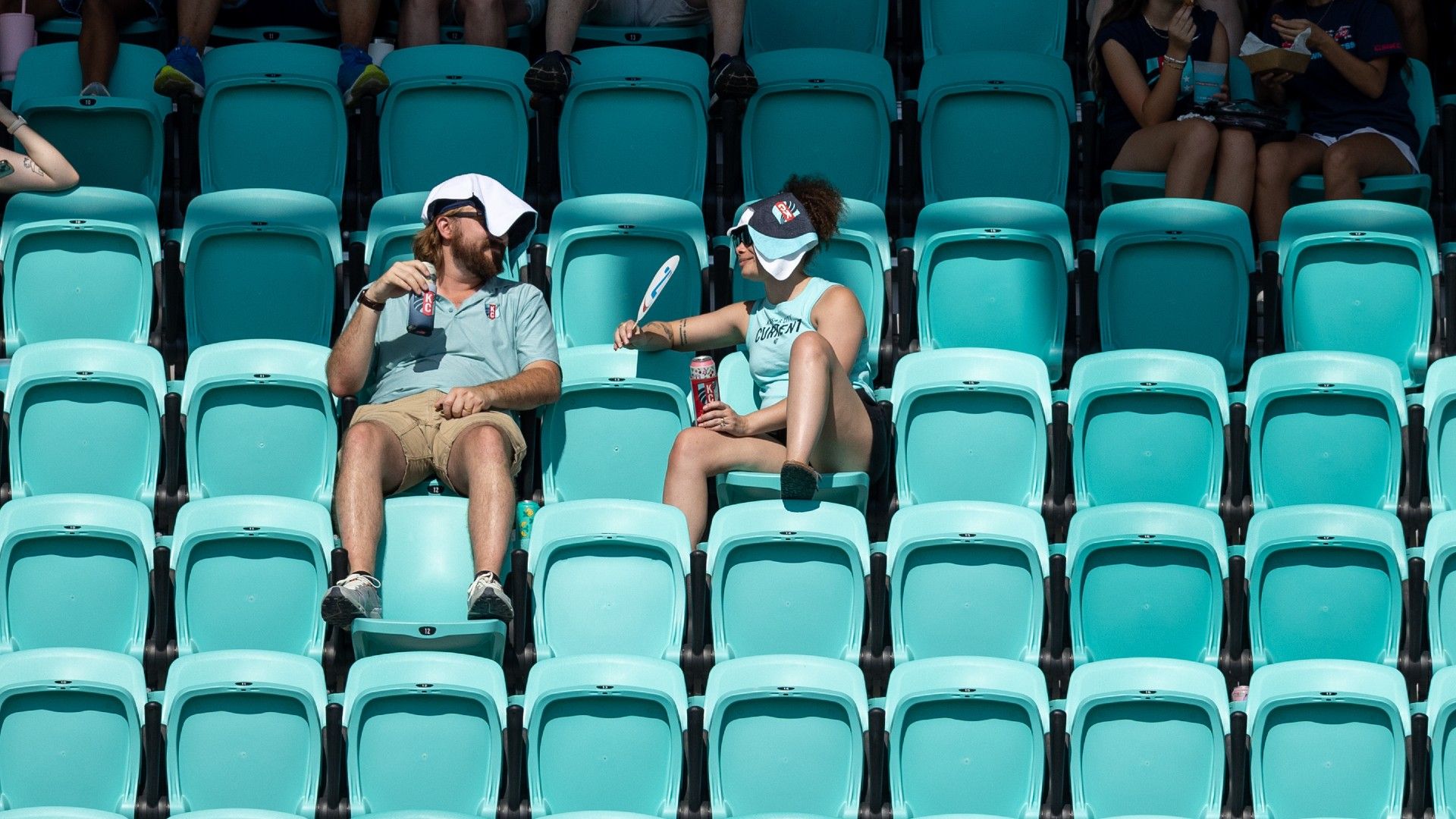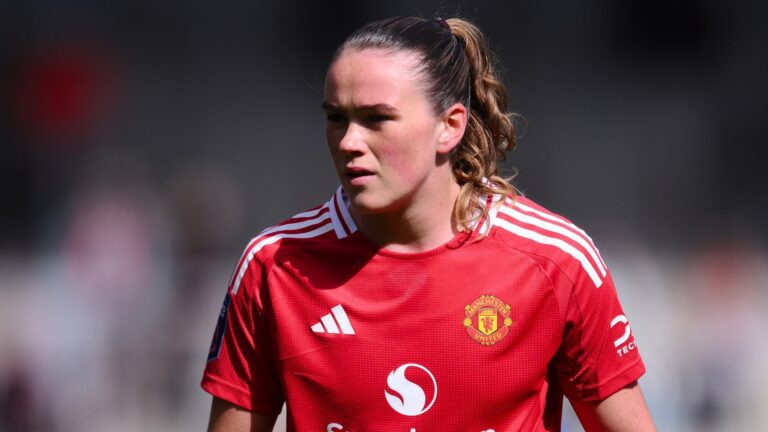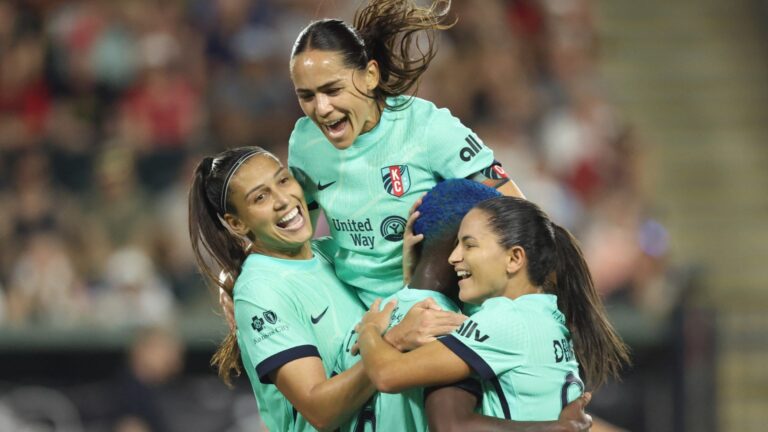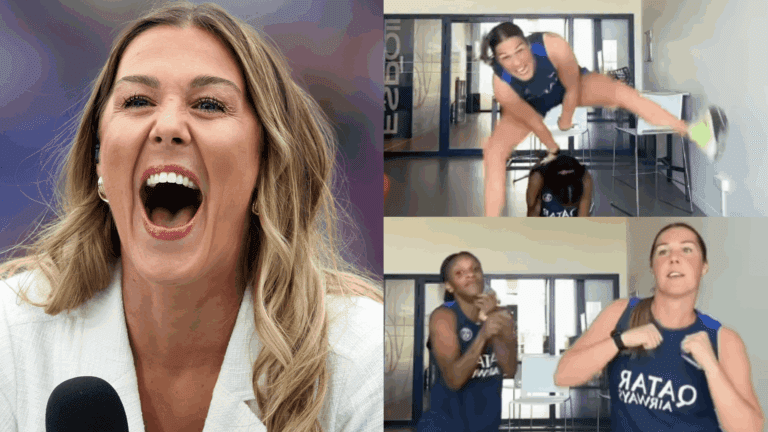- NWSL reportedly threatens fines for KC Current
- Last week’s match saw three hours of delays
- NWSLPA fires back at league



Heat Wave Showdown: NWSL Fines Loom for KC Current Over Safety Dispute
In the midst of escalating tensions between player safety and broadcast schedules, the NWSL and KC Current are at odds following a lengthy weather-related postponement. This incident highlights ongoing challenges in managing extreme conditions during matches, raising questions about league protocols and athlete welfare.
NWSL’s Response to the Weather Delay Incident
Recent reports suggest that NWSL Commissioner Jessica Berman is contemplating sanctions against the Kansas City Current after a delay exceeding three hours due to scorching temperatures during their recent matchup. This conflict stems from efforts to prioritize health amid blistering heat, illustrating the delicate balance between competition and caution in professional sports.
The Match Details and Temperature Challenges
The Kansas City Current welcomed the Orlando Pride to their home field, where the game, initially set for an early afternoon start, was pushed back to evening hours. Soaring temperatures above 90 degrees on the pitch triggered league guidelines, which mandate assessments to determine if conditions are suitable for play. A reading taken shortly before the original kickoff time hovered just under the critical threshold, yet it sparked debates over whether the game should proceed.
League Guidelines and Decision-Making Process
In line with NWSL regulations, the fourth official conducted a temperature check 15 minutes before the scheduled start, confirming readings close to 93 degrees. These rules vest ultimate authority with the league for any postponements, emphasizing data-driven choices over external influences. Both teams reached out to league officials with worries about the weather, proposing a later start, but were instructed to follow the planned timeline while adhering to heat management strategies.
Impact on Broadcasting and Fan Experience
This fixture represented one of 11 prime-time regular-season games aired on CBS this year, but the extended wait shifted it to an online platform instead. A statement from the league to media outlets underscored their commitment to proceeding with games when safe, relying on live weather updates rather than predictions to guide decisions under their weather protocols.
Medical reports from the University of Kansas Health System indicate that 18 individuals sought treatment for heat-related issues at the venue, with one requiring hospital transport-a stark reminder of the real risks involved. Feedback from fans, such as Danielle Russell from the KC Blue Crew fan club, pointed to poor communication during the delays, stressing that safety must outweigh scheduling conflicts, especially for high-profile events known to face environmental hazards.
Player Association’s Early Warnings
The NWSL Players Association had flagged potential problems with the schedule as far back as January, when the season lineup was finalized. NWSLPA executive director Meghann Burke noted that their agreement allows input on timetables, and they specifically highlighted the dangers of a mid-afternoon kickoff in Kansas City’s summer climate.
Critiques of the Delay Handling
Burke criticized the repeated warm-up sessions and incremental postponements, suggesting they reflected either overly optimistic expectations about cooling temperatures or an attempt to find excuses to play in hazardous conditions. She praised the medical staff’s expertise, attributing it to recent investments in healthcare and technical support through collective bargaining agreements, and insisted that such calls should remain in the hands of qualified professionals rather than administrative pressures.
Broader Implications for Player Safety in the NWSL
Recent updates reveal that weather-related interruptions have risen by 25% this season compared to last year, with similar incidents drawing scrutiny, such as the decision to continue a game after an Angel City player collapsed earlier in the campaign. Burke emphasized that external demands, like national broadcasts, appear to influence these choices, potentially undervaluing player well-being despite strong medical responses on site.
Ongoing Season Developments
With the league advancing into Matchday 17, the Orlando Pride recently suffered a 1-0 loss to Angel City, while the KC Current prepares for an upcoming clash against the Portland Thorns. These events continue to fuel discussions on refining NWSL policies to better address environmental risks and ensure that health remains the top priority in professional women’s soccer.
The Weather Delay Incident Involving KC Current
In the fast-paced world of women’s soccer, the NWSL Commissioner Allegedly Considers Fine for KC Current has sparked widespread discussion among fans, players, and league officials. This controversy stems from a recent match involving the Kansas City Current, where severe weather conditions led to significant delays. Understanding the nuances of such situations is crucial for anyone following the NWSL or interested in sports management.
The incident occurred during a high-stakes game, where a sudden storm forced officials to halt play, raising questions about protocol adherence and safety measures. KC Current, known for its dynamic play and growing fanbase, found itself at the center of scrutiny as league rules on weather delays were reportedly not followed to the letter. This has led to speculation about potential fines, highlighting the NWSL’s commitment to maintaining standards in women’s professional soccer.
Key Details of the Controversy
Delving deeper, the weather delay controversy involves allegations that KC Current’s management did not promptly communicate with NWSL officials or implement required safety protocols. According to reports, the delay extended beyond the league’s guidelines, potentially endangering players and spectators. This has put the NWSL Commissioner in a challenging position, as enforcing fines could set a precedent for future incidents.
- Timeline of Events: The match was paused due to lightning and heavy rain, with delays lasting over an hour. Sources indicate that KC Current’s staff may have underestimated the storm’s severity, leading to delays in evacuating the field.
- League Rules at Stake: NWSL regulations mandate strict weather delay protocols, including immediate suspension of play and clear communication channels. Violations could result in fines ranging from thousands of dollars, emphasizing the league’s focus on player safety in women’s soccer.
- Stakeholder Reactions: Fans and analysts have taken to social media to debate the issue, with some defending KC Current’s actions as reasonable given the circumstances, while others call for stricter enforcement to prevent similar NWSL weather delay controversies.
Implications for the NWSL and KC Current
The potential fine for KC Current could have broader implications for the entire NWSL ecosystem. If imposed, it might lead to enhanced training for teams on weather-related protocols, ultimately improving the overall integrity of women’s soccer matches. This situation underscores the balance between competitive spirit and safety, a common challenge in professional sports leagues.
For KC Current specifically, the controversy could affect team morale and public perception. As one of the league’s rising stars, with players like Vanessa DiBernardo and an expanding fanbase, any disciplinary action might influence sponsorships and ticket sales. On a positive note, this could prompt the team to invest in better weather monitoring technology, turning a setback into an opportunity for growth.
Benefits of Strict Enforcement in the NWSL
Enforcing rules like those potentially leading to a fine for KC Current offers several benefits for the NWSL and similar leagues. Strict adherence to weather delay protocols can enhance player safety, reduce injury risks, and build trust among fans. In the long term, it promotes a culture of professionalism in women’s soccer, encouraging teams to prioritize preparedness.
- Improved Safety Standards: By holding teams accountable, the NWSL can minimize hazards like those seen in the KC Current incident, potentially reducing weather-related injuries.
- Enhanced League Reputation: Consistent enforcement helps position the NWSL as a leader in women’s sports, attracting more sponsors and viewers.
- Long-Term Player Welfare: Fines and reviews can lead to better resources, such as advanced weather apps or emergency training, benefiting athletes across the league.
Practical Tips for Handling Weather Delays
For teams, organizers, and even fans involved in NWSL or other sports events, learning from the KC Current weather delay controversy can be invaluable. Here are some practical tips to manage such situations effectively:
- Invest in Real-Time Monitoring Tools: Use apps or devices that provide accurate weather forecasts and alerts to anticipate delays before they occur.
- Develop Clear Communication Plans: Establish protocols for notifying players, staff, and fans quickly, ensuring everyone knows evacuation routes and rescheduling options.
- Conduct Regular Drills: Teams should run simulations for weather emergencies to build familiarity and reduce panic during actual events.
- Collaborate with Local Authorities: Work with weather services and emergency responders to stay ahead of potential storms, as seen in the KC Current case.
Case Studies from Other Leagues
Drawing parallels from other sports leagues can provide context to the NWSL’s approach. For instance, in Major League Soccer (MLS), a similar weather delay during a 2022 match led to fines for a team that delayed evacuation, resulting in revised league policies. In the WNBA, incidents like those involving storm delays have prompted investments in covered arenas, reducing the frequency of such issues.
Another example comes from European football leagues, where UEFA has fined clubs for inadequate weather management, leading to improved infrastructure. These case studies illustrate how controversies like the one with KC Current can drive positive change, reinforcing the NWSL’s potential for growth.
First-Hand Experiences from the Soccer Community
Personal accounts from players and coaches offer real insights into weather delay challenges. A former NWSL player shared in interviews how a similar storm delay left her team feeling anxious and unprepared, emphasizing the need for better guidelines. Fans at KC Current games have reported mixed experiences, with some praising the staff’s efforts while others highlighted communication gaps.
These stories highlight the human element in sports controversies, reminding us that behind the potential fine for KC Current are dedicated athletes striving to perform in a professional league like the NWSL. By learning from these experiences, the league can continue to evolve, ensuring weather delays don’t overshadow the excitement of women’s soccer.










